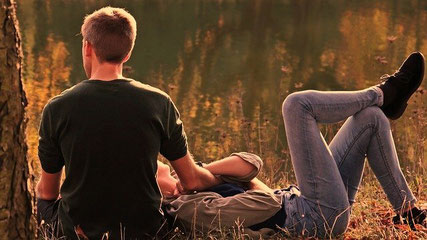
In my last column, I talked about romantic relationships and the importance of small and frequent positive interactions. So, what kind of things can you do to maintain a healthy and happy relationship?
As I mentioned last time out, all couples argue, but happier couples compensate for negative moments by experiencing multiple positive moments. In one study of 52 divorced couples, the vast majority reported their relationship was characterised by too much conflict and arguing. Communication problems increased in frequency and intensity over time, with this being linked to ‘lost feelings of positive connections and mutual support’. When couples aren’t doing things that create positivity, they can become emotionally disengaged from each other. They lose their positive bond. Without this bond, tensions are likely to mount and arguments become more frequent, more destructive.
In other words, you need to keep that positive bond alive; lots of shared good moments helps you survive the bad moments.
With relationships, you should beware of the “feast or famine” mentality – that is, you don’t want a situation where you rarely share positive moments (famine) which you then try to make up for with the occasional “feast”. As relationship expert Dr John Gottman puts it, aim for ‘small things often’ – small, everyday interactions that demonstrate commitment and warmth.
MICRO-ACTIONS

it’s a good idea to try and come up with a list of possible ideas. In her book The Healthy Mind Toolkit, psychologist and CBT expert Dr Alice Boyes lists a variety of possible ‘micro-actions’ for increasing that positive bond, many of which take 30 seconds or less.
Simple ideas include giving your partner a six-second hug (this releases feelgood, bonding chemicals like oxytocin and serotonin); showing appreciation for a job your partner does, but which you rarely spontaneously thank them for; mentioning a nice memory of something you did together recently (“I really enjoyed when we sang in the car together last week”); mentioning that you are looking forward to something you will be doing together soon (“I can’t wait for us to go hiking in the Mizen next week”; “I’m looking forward to chilling out with you on the couch on Friday night”). Making a positive comment about one of your partner’s friends – “Jack really makes the effort to keep in touch with you, even though his own life is really hectic” – is a good idea, says Boyes. Why? ‘It says: I’m tuned in to your life. I understand what you get out of being friends with that person. I don’t think all the judgments/choices you make in your life are completely nuts.’
You can come up with your own ideas. What works for you and your partner? If you both like music, you might like to create a playlist of songs that mean something to you both – for example, songs you listened to when you first started going out, songs you associate with precious holidays together, songs that evoke a time or place that means something to one or both of you, corny songs that make you laugh.
Plan outings together. You might say, it’s ages since we’ve been to Kinsale, let’s act like tourists and do that walking tour of the town, head to Dino’s afterwards and eat chips on the wall by the water. Or maybe you’d like to go to Baltimore; walk the Beacon or get a ferry to Sherkin or Cape Clear, followed by pizza on the square before you return home. Walking the Sheep’s Head Way, driving the Beara peninsula and stopping off in multi-coloured Eyeries or Allihies, heading off to pretty coastal spots like Courtmacsherry or Glandore – even planning such moments can bring a couple closer, not to mind the pleasure afforded by the experiences themselves.
Looking at old photos together, cosying up on the couch together after a long day, making time for a shared walk in the evening, getting your partner’s help with a puzzle or crossword, laughing over your favourite sitcom, making sure to know your partner’s inner world and continuing to show interest in their likes and dislikes, their opinions and aspirations – these are small things, but the small things are important in relationships, the glue that bonds a couple together.